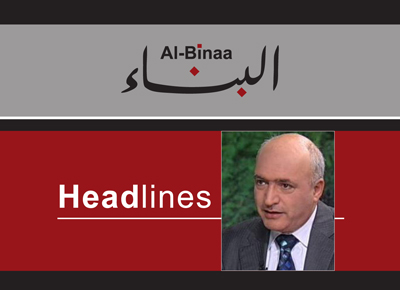Qassem: Hezbollah Aligns Its Efforts According to Nasrallah’s Plan, Ready for Ground Engagement / Berri and Mikati Inform Barrau of Their Openness to a Dynamic Approach to Resolution 1701 and the Presidency After the Ceasefire
The Entity’s Government and Army Set the Stage for Ground Operations With Preliminary Bombardment

October 01, 2024
The political editor wrote
The occupying entity’s government, followed by its army leadership, announced a decision to initiate a ground military operation along the southern Lebanese border. Both parties appeared pressured by the continued barrage of resistance rockets striking northern occupied Palestine, a clear indication of the interconnectedness between the Lebanese and Gazan fronts. These operations signal both the activation of the Gaza support front and the obstruction of plans seeking to return displaced settlers in the north before halting the aggression on Gaza. An additional pressure source is public opinion, bolstered by the successes of aerial and intelligence operations, along with Prime Minister Benjamin Netanyahu’s lofty rhetoric about reshaping the Middle East, further fueled demands for accelerating the ground offensive, making it a recurring theme in the entity’s discourse, media, and among settlers.
By midnight, infantry and armoured units had deployed in the triangle formed by the settlements of Metula, Misgav Am, and Kfar Giladi, with artillery and air bombardments extending from Koukkaba in Western Bekaa to Aita al-Shaab in the west. Illumination flares and thermal balloons were deployed, giving the impression that ground operations were underway. Meanwhile, reports circulating in American media, attributed to U.S. and Israeli officials, suggested that the operation would be temporally and geographically limited, barely crossing the contact line, signalling significant concerns about potential failure. This limitation appears to be a preemptive measure, with any expansion contingent on achieving success.
The Resistance, unwavering in its rocket attacks on northern occupied Palestine, made its presence known through Hezbollah’s Deputy Secretary-General, affirming its resilience and readiness to continue the fight with the same objectives, hopes, and determination, despite the pain, wounds, and severity of the blows sustained – the assassination of Hezbollah Secretary-General Sayyed Hassan Nasrallah being the most recent and grievous among them. Qassem stated that the party is reorganising its ranks, leadership structures, and institutions according to plans devised by Nasrallah before his martyrdom, in anticipation of the challenges that may befall the party and the Resistance. He emphasised that there will be no retreat from the Gaza support front, assuring that the disrupted deterrence equation will be restored at the right time, along with a response to the airstrikes targeting the south, Beirut’s southern suburbs, and the Bekaa. Qassem also confirmed that the Resistance’s strategic missile capability remains intact and that its forces along the border are fully prepared for ground engagement.
On the diplomatic front, France’s new Foreign Minister, Jean-Noël Barrau’s arrival in Beirut coincided with Washington’s withdrawal from the joint paper it had co-signed with France, along with several Western and Arab nations, due to its call for a ceasefire – something Tel Aviv no longer desires – and its symbolic reference to the interconnectedness of the Lebanese and Gazan fronts, as it mentioned the implementation of Resolutions 1701 and 2735. He affirmed that the paper remains on the table, and that Paris is exerting exceptional efforts to use it as a foundation for a diplomatic solution. This solution would begin with ruling out ground operations in Lebanon and enforcing a ceasefire. Barrau heard from Speaker of Parliament Nabih Berri and Prime Minister Najib Mikati about Lebanon’s openness to launching a dynamic process to implement Resolution 1701 and hold presidential elections following the ceasefire. After his meetings with the French foreign minister, caretaker Prime Minister Mikati, and later Army Commander General Joseph Aoun, Berri stated: “We informed the French minister of Lebanon’s commitment to the contents of the statement issued by the ten nations, calling for a ceasefire and the immediate implementation of Resolution 1701, based on the terms agreed upon with the American envoy.” He confirmed that his stance aligns with Mikati’s and expressed support for his statements. In response to a question, Berri clarified that communication with Hezbollah remains ongoing and that the party is aligned with this direction. He added, “The initiative I previously proposed had been fully coordinated with Sayyed Hassan Nasrallah, and this understanding remains in effect.”


